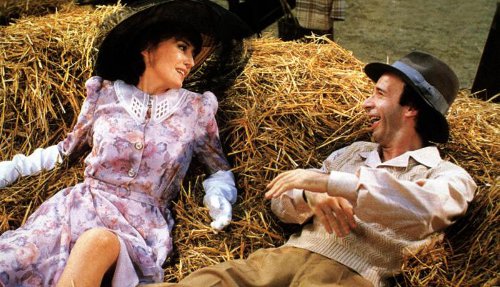“Buongiorno
Principessa!”
La Vita E
Bella (1997), known by many as its English title of Life Is Beautiful, is an
Italian film directed by Roberto Benigni, who also stars as a charming man who
uses his humour to both win over the woman of his dreams and save his family
from unthinkable tragedy in occupied Italy during the Second World War. It's an incredibly entertaining and moving
film that will have any engaged audience member laughing one minute and close
to tears the next. The film seeks to
demonstrate the truth behind its own title, and I will comment on why it is a
must-see for any cinema enthusiast without the usual spoiler alert.
Life Is
Beautiful is so uniquely memorable because it explores a traditionally touchy
subject through an optimistic lens.
Guido, Benigni’s character, appears carefree and free-spirited but is
also tenacious and clever. This loveable
protagonist is the victim of terrible circumstance and yet is able to lift his
head and live a lively life. For
instance, he gives a speech in front of a bunch of primary school students
pretending to be the superintendent – and the topic was one of appraisal for
the Aryan race. Oh, I forgot to mention
that Guido is Jewish (this becomes evident quite early on). This form of boldness has to be humourous –
and it is, both for the school kids and the audience.
“What kind
of place is this? It's beautiful!
Pigeons fly, women fall from the sky – I’m moving here!”
-Guido
Apart from
Guido’s funny stunts and flirtations with the Princess, the film progresses to
demonstrate his strategy for the ominous conflict he faces: he smiles
ferociously and laughs even when he shouldn’t.
He makes danger a game solely to comfort and reassure his young
son. An added element of spontaneity due
to Guido’s antics tickles and teases audience attention. But by no means is the film as simple as that.
In terms of
film techniques and directorial touch, the dialogue and plot are what really
shine through the dark undercurrents.
The camera focus is always on the faces of characters who are shown
sometimes together but just as often apart.
The cuts between shots are uncomplicated and, in fact, less frequent
that the average film. This is because
the average shot (the point between cuts to different focuses) length of films
in general is noticeably shorter than those in Life Is Beautiful. This was undoubtedly a purposeful choice by
Benigni, who wanted to tell an emotional story while using the camera positions
to echo Guido’s carefree, less abrupt stance.
The audience was meant to follow him until the end, and we are happy to
oblige.
Bartolomeo:
They are looking for someone who speaks German, to translate their
instructions.
Guido: Me!
I'll do it, I'll translate!
Bartolomeo:
Do you speak German?
Guido: No!
Other
features of the film that add to its cinematic value and entertainment are the
original music score, unlikelihood of events and a severely effective batch of
dramatic irony. The music is generally
upbeat and opera – the sort that makes one instantly think: ‘Italia!’ The irony needs no introduction beyond the
previous explanation of Guido’s identity and the film's historical
context. And that brings us to a
conclusion.
Benigni has
essentially managed to create a film that truly does wrench the heart and draw
many more than a few chuckles simultaneously.
His touch is brilliantly crafted through a clear message: that life is,
in itself, beautiful. The ending is not
something that could be easily discussed regardless of the spoiler alert; it is
thought-provoking, emotional, impeccable.
One has to believe after watching this film that legacies and stories of
love and loyalty will always hold a special place in any human heart.
Guido,
you’ve done well. Benigni, you’re a
genius.
Trailer
available here:
http://www.youtube.com/watch?v=64ZoO7oiN0s


No comments:
Post a Comment